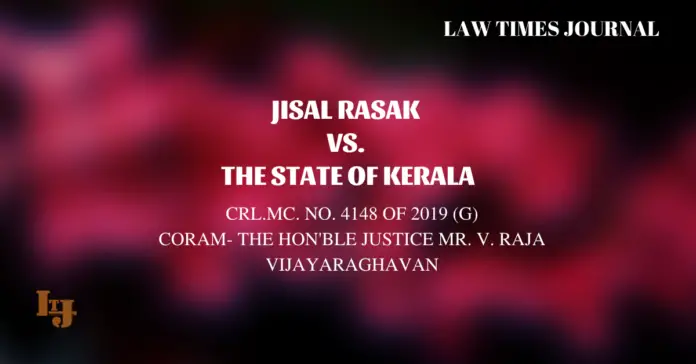
Before the High Court of Kerala
Crl.MC. No. 4148 of 2019 (G)
Petitioner
Jisal Rasak
Respondent
The State of Kerala
Date of Judgement
30 September 2019
Bench
The Hon'ble Justice Mr. v. Raja Vijayaraghavan
Facts of the case
The petitioner herein was an accused in the case C.P. No.9 of 2019. He was charged for having committed offences punishable under Sections 302, 307, 120B, 143, 148, 341, 506(ii), 323, 326, 201 and 212 of the IPC.
During investigation, the investigating officer in order to prove the crime of murder, retrieved footage by following the procedure and the same was forwarded to the Cyber Forensic Lab for analysis and a report was obtained. The footage was produced before Court along with the final report by categorizing the same as a material object.
The petitioner approached the learned Magistrate and filed an application seeking to obtain copies of the CCTV footage relied on by the prosecution. The learned Magistrate ordered for the issuance of the records, which were requested for, but refused to issue digital copies of the camera footage. The present petition was filed challenging the above order.
Issues Raised
The issues before the Hon’ble HC were:
1. Whether CCTV footage is a material object?
2. Whether the accused is entitled to the digital copy of CCTV footage?
Arguments advanced
The counsel appearing for the petitioner submitted that the electronic evidence relied on by the prosecution is a material object and the petitioner is entitled to digital copy of the same. S. 3 of the Indian Evidence Act defines “evidence” as all documents, including electronic records produced for the inspection of the Court. Referring to the relevant provisions of the Information Technology Act, 2000, it was argued that a document under Section 3 of the Indian Evidence Act would definitely include electronic records as defined under Section 2(t) of the Information Technology Act.
The counsel appearing for the respondent submitted that the law recognises a third category of evidence in addition to oral evidence and documentary evidence, which is ‘real evidence’ or ‘physical evidence’ and it consists of material objects other than documents produced for inspection of the Court. Further, material evidence is not covered under Section 207 of the Cr.P.C. and there is no law, which provides for the issuance of a copy of a material object.
Relevant Provisions
1. 173(5) of CrPC. makes it imperative on the part of the Investigating Officer to forward all documents and relevant extracts, which the prosecution proposes to rely, so as to enable the learned Magistrate to hand over the same to the accused. Further, S. 207 of CrPC. makes it mandatory for the Court to furnish to the accused with certain documents.
Decision of the Hon’ble High Court
The High Court held that the CCTV footage in the instant case is “data” as defined under Section 2(o) of the Information Technology Act, 2000 and it is an electronic record as defined under Section 2(t) of the I.T. Act. Further, the electronic record produced for the inspection of the Court has to be regarded as documentary evidence. CCTV footage cannot be classified as material object and hence the accused is entitled to a copy of the same refusing to supply a copy of the same to the accused.
Edited by Sree Ramya
Approved & Published – Sakshi Raje








